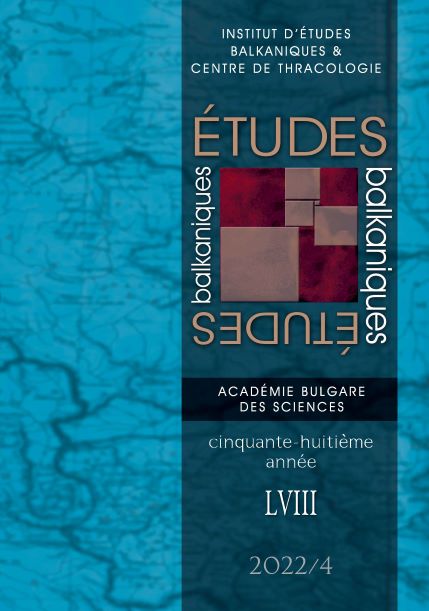BULGARIAN-GREEK DISPUTES ON THE PAGES OF PERIODICALS DURING THE 19th CENTURY (FROM THE POLEMICS BETWEEN ‘TSARIGRADSKI VESTNIK’ AND ‘BOSPHORUS TELEGRAPH’)
BULGARIAN-GREEK DISPUTES ON THE PAGES OF PERIODICALS DURING THE 19th CENTURY (FROM THE POLEMICS BETWEEN ‘TSARIGRADSKI VESTNIK’ AND ‘BOSPHORUS TELEGRAPH’)
Author(s): Andriana SpasovaSubject(s): History, Media studies, Communication studies, Sociology, Ethnohistory, History of ideas, Modern Age, Special Historiographies:, Nationalism Studies, Sociology of the arts, business, education, 19th Century, The Ottoman Empire, Ethnic Minorities Studies, Identity of Collectives
Published by: Институт за балканистика с Център по тракология - Българска академия на науките
Keywords: Bulgarian-Greek polemics; pejorative rhetoric; Nayden Gerov; Georgios Tsoukalas; expressive ideologies; national-ideological texts;
Summary/Abstract: The present article is focused on separate aspects of the political skirmish between two prominent representatives of the Bulgarian and Greek communities – Nayden Gerov (1823 – 1900) and Georgios Tsoukalas / Γεώργιος Τσουκαλάς (1804 – 1872). At the beginning of the 50s of the XIX century, the establishment of the Bulgarian school in Plovdiv gave rise to one of the first public disputes between the two ideologists in the context of the development of nationalisms. The article depicts some moments from the Bulgarian-Greek arguments on the pages of periodicals – ‘Tsarigradski vestnik’ and ‘Bosphorus Telegraph’. In a word duel, the two intellectuals resort to the specific pejorative rhetoric of subversion and slander. This strategic rhetoric is characterized by an intensified ideological load and lavish figurative argumentation, often accompanied by expressive ideologies, with a multitude of offensive words, provocations and critical comments. Through the use of such rhetorical techniques, the prominent socio-political figures aim not simply at the personal undermining of their opponent, but above all, at defending their own ideology and contestation of the alternative opinion. In the confrontation between the text strategies (some of them deliberately anonymous, allowing the identification of the people with the text) of N. Gerov and G. Tsoukalas, the two political programs are revealed in their contrast and convergence to the own / foreign ideological code.
Journal: Études balkaniques
- Issue Year: 2022
- Issue No: 4
- Page Range: 595-608
- Page Count: 14
- Language: English
- Content File-PDF

